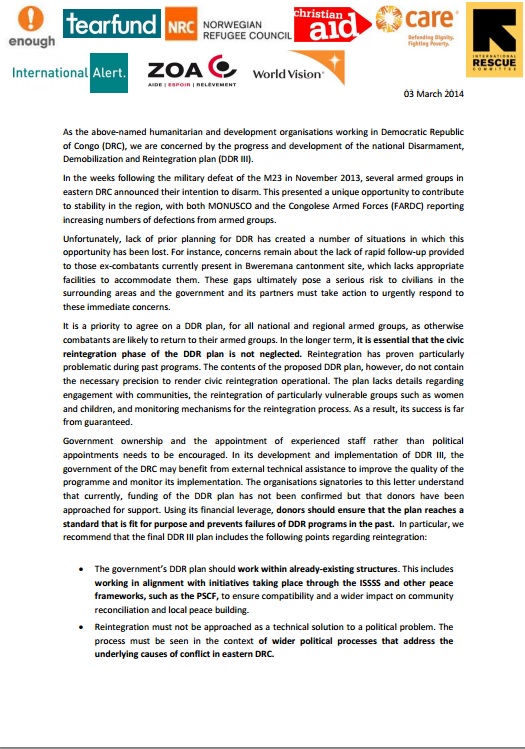
As the above-named humanitarian and development organisations working in Democratic Republic of Congo (DRC), we are concerned by the progress and development of the national Disarmament, Demobilization and Reintegration plan (DDR III).
In the weeks following the military defeat of the M23 in November 2013, several armed groups in eastern DRC announced their intention to disarm. This presented a unique opportunity to contribute to stability in the region, with both MONUSCO and the Congolese Armed Forces (FARDC) reporting increasing numbers of defections from armed groups.
Unfortunately, lack of prior planning for DDR has created a number of situations in which this opportunity has been lost. For instance, concerns remain about the lack of rapid follow-up provided to those ex-combatants currently present in Bweremana cantonment site, which lacks appropriate facilities to accommodate them. These gaps ultimately pose a serious risk to civilians in the surrounding areas and the government and its partners must take action to urgently respond to these immediate concerns.
It is a priority to agree on a DDR plan, for all national and regional armed groups, as otherwise combatants are likely to return to their armed groups. In the longer term, it is essential that the civic reintegration phase of the DDR plan is not neglected. Reintegration has proven particularly problematic during past programs. The contents of the proposed DDR plan, however, do not contain the necessary precision to render civic reintegration operational. The plan lacks details regarding engagement with communities, the reintegration of particularly vulnerable groups such as women and children, and monitoring mechanisms for the reintegration process. As a result, its success is far from guaranteed.
Government ownership and the appointment of experienced staff rather than political appointments needs to be encouraged. In its development and implementation of DDR III, the government of the DRC may benefit from external technical assistance to improve the quality of the programme and monitor its implementation. The organisations signatories to this letter understand that currently, funding of the DDR plan has not been confirmed but that the World Bank has been approached for support. Using its financial leverage, the World Bank should ensure that the plan reaches a standard that is fit for purpose and prevents failures of DDR programs in the past. In particular, we recommend that the final DDR III plan includes the following points regarding reintegration:
- The government’s DDR plan should work within already-existing structures. This includes working in alignment with initiatives taking place through the ISSSS and other peace frameworks, such as the PSCF, to ensure compatibility and a wider impact on community reconciliation and local peace
- Reintegration must not be approached as a technical solution to a political problem. The process must be seen in the context of wider political processes that address the underlying causes of conflict in eastern
- Ex-combatants should to the greatest possible degree be reintegrated into their communities of origin. Reintegration into the FARDC needs to be linked to a separate vetting and SSR process. The proposal to relocate ex-combatants not joining the army permanently to the west of the country must be ruled out. Communities should be involved in the whole reintegration process, from design to implementation. The communities located around reintegration centres should be consulted, and continuous dialogue must take place with those affected by the returns of former
- The focus should be on community reconciliation efforts and building the skills of ex-combatants in order to give them viable livelihood alternatives. Reintegration projects should be designed with community members before civic reintegration of combatants in order to benefit the whole community, to promote better reintegration economic and social interdependence, and in order to reduce hostile attitudes of communities towards ex-combatants.
- Women combatants and women associated with armed groups should benefit fully from reintegration projects, as should children and disabled ex-combatants. Mechanisms should be put in place to account for their specific needs, and the psychological needs of ex-combatants must be properly addressed.
- In order to properly provide a follow-up throughout the five-year DDR process, each ex-combatant must be issued with a case worker to oversee their progress. These case workers should maintain good contact with the community as a whole in order to ensure proper attention to wider concerns. The resources for this must be clearly defined by the government, in addition to realistic ratios.
Finally, a comprehensive and long-term monitoring and evaluation tool must be elaborated to ensure the successful implementation of the DDR plan and monitor its progress, particular around reintegration. This could work within the framework of the ISSSS revised monitoring and evaluation tool, to ensure impact on an aggregate level is achieved. This would allow for adaptability of the plan, enabling the government to rapidly respond to immediate concerns and to fine-tune the reintegration concept over time. This could be facilitated by a gradual release of funding based on progress and accountability, including milestones set out with the government of DRC. To prevent funding from being misused, as occurred with previous DDR programs in the DRC, an independent financial oversight board should be established.
It is paramount to respond immediately to the needs of surrendering combatants, and for this reason the plan must move forward both in its design and its implementation. However, to go beyond emergency assistance and ensure the sustainability of the overall DDR plan, it is essential that the process is neither rushed nor incomplete. DDR for the numerous armed groups present in eastern DRC is one of the critical challenges for lasting peace in the wider region. The successful reintegration of thousands of ex-combatants into civilian communities is crucial: the alternative is to see them pose a continued threat to civilian safety and stability in DRC.
We thank you for your consideration of this letter and would appreciate the opportunity to discuss this further with you at your convenience.

